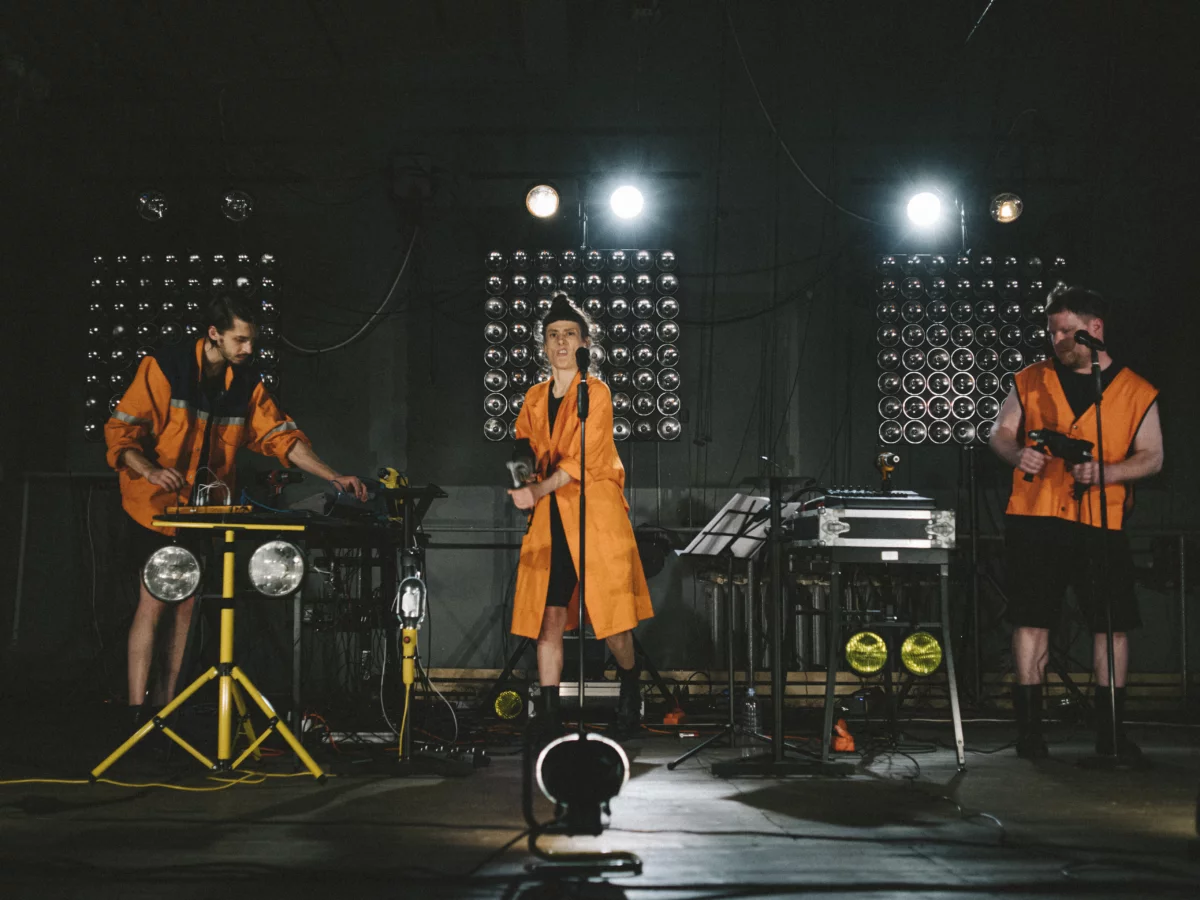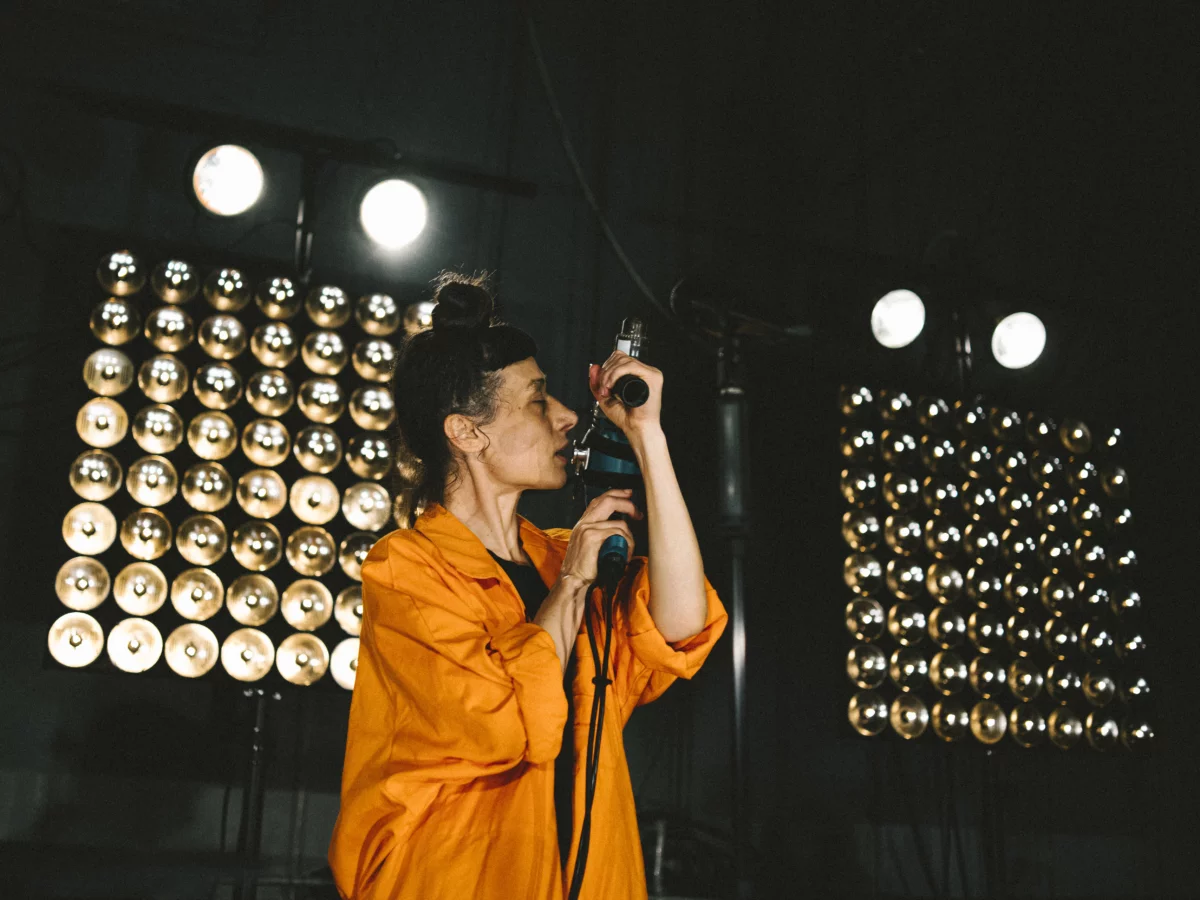»Handelt bitte nicht so, als würde alles, jede und jeder Euch gehören.«
By Tom Mustroph
The teatru-spălătorie from Moldova was founded in 2010. It is characterized by uncomfortable works, uncomfortable for many of those being addressed. For more than 10 years it has been supported by Berlin's HAU Hebbel am Ufer. The latest production "Symphony of Progress", which massively shakes up belief in progress, was shown there too. The interview with the teatru-spălătorie collective was conducted by email in April 2022.
 © Ramin Mazur
© Ramin Mazur
Tabori Auszeichnung international 2022 für Nicoleta Esinencu & teatru-spălătorie
When I first heard about teatru-spălătorie, I already liked the name. It means laundry. How did you come up with it? And what have you washed there so far?
teatru-spălătorie: The name comes from the place where we started our performances, the basement of a former laundry. But of course, it was also connected to wanting to wash dirty laundry in public. In "Clear History" we address issues from our recent past that are frequently suppressed, such as the participation of the local population of present-day Moldova's territory in the Jewish Holocaust during World War II. "Abolition of the Family" examines the institution of the family and how the patriarchal-capitalist system benefits from it. "Symphony of Progress" deals with the exploitation of migrant workers in Western Europe, "Requiem for Europe" with the exploitation of weak labor legislation and low wages in countries like Moldova by international companies.
So there's a lot of dirty laundry being dragged out into the light?
Yes, of course. "Gospel of Mary" examines the patriarchy, as preached in the Bible, and calls for a feminist revolution. "Life" explores individual resistance during the occupation of Donbass, in times when battles are being fought both on the battlefield and through propaganda in mass media and social media.
Since February 2022, the war in Ukraine has been fought on a new, even more brutal level. Moldova, where you all live and work, shares a border with Ukraine. How has the war changed life in Moldova?
It was shocking and surprising when Russia invaded in February and many people had to flee. Overnight, Moldova became a place of refuge. Since then, hundreds of thousands have crossed Moldova's borders, most of them moving on. But about 100,000 remained in Moldova, hoping for an early end to the war. The state of Moldova has no financial reserves. The infrastructure and human resources for helping the refugees from Ukraine do not exist. This is not surprising for us, because Moldova doesn't even manage to take good care of its own citizens. What is shocking, however, is that all the international organizations that came to Moldova in the last two months are equally incapable of meeting the basic needs of the refugees. There are still refugee camps in Chișinău without drinking water and with only improvised beds. Daily food supply is a problem. The local population still bears the greatest burden.
However, it must also be said that the famous Moldovan hospitality has not been extended to all refugees. Roma who fled the war are not welcome in any private households. The state sends them to segregated camps with the harshest conditions.
That is depressing news. How has the overall situation influenced your artistic work?
We couldn't focus on that at all in the last two weeks and have tried to help refugees. Friends of our theater made donations; we've also applied for grants. Some applications have been accepted, some have been rejected. Some donors wanted photos of the refugees because they did not see us as trustworthy.
In general, how are your working conditions in Chișinău? Do you have your own space?
Working conditions for the independent performing arts have not changed significantly since our beginnings in 2010. There is a lack of venues, general infrastructure and public support. There is still no interest, not even curiosity, from state institutions regarding the work of independent collectives. Not one single space has belonged to us in all this time. From 2010 to 2017, we rehearsed and performed in the basement of an old laundry. From 2012 we also had a bar and organized parties to pay the rent. Then the area was gentrified. Since then, we've been rehearsing in different spaces, sometimes paying rent, sometimes for free.
What are funding conditions like in Moldova?
The Ministry of Culture as well as the Municipal Department of Culture think their job is to organize Christmas markets, celebrate sexist poets, hold national celebrations for Independence Day and hand out some medals to deserving older artists instead of paying them decent pensions.
In recent years there has been a small change. Through the influence of the EU and experts from the World Bank, they came up with the idea that a more progressive Ministry of Culture should sponsor creative industries and cultural tourism, and that art should sell and artists should turn into entrepreneurs.
And no, we don't get any government funding and there are no local private foundations that support the performing arts.
How did you all come to teatru-spălătorie? Can you describe what initially fascinated you about it, and the way in which you are involved in the ensemble?
Nicoleta Esinencu:
I am one of the co-founders of teatru-spălătorie. I would like to emphasize that we are not an ensemble, but a collective. The idea is that we do things together, not centering around one person. We tried to find an alternative way of working, different from what we learned in school or saw in state theaters. We didn't have a clear idea of what it was going to be, but we knew exactly what it wasn't going to be.
Doriana Talmazan:
I am an actress and one of the washerwomen who has been in teatru-spălătorie since the beginning. My experience with municipal theater awakened in me the desire for an individual, political and uncomfortable theater, one where I can create things with people who have a critical view of the world we live in. I like the phase of researching and the documentary stage. It's a learning process for me. And of course, I also like it when I meet people over a drink after the show and realize that I have succeeded in provoking the question in at least one member of the audience that has been bothering me too. What I like about the spălătorie is that we are a non-hierarchical collective, without the authority of a director, without sexist and patriarchal attitudes - all the things we had to take on in other theaters.
Kira Semionov:
I joined teatru-spălătorie at the end of 2014. My main tasks are sound and lighting, but I also perform on stage. We are organized horizontally and this way of working in a collective is one of the many reasons I love being part of teatru-spălătorie.
Artiom Zavadovsky:
I am a performer and media art student. I've been involved from the beginning, first as a spectator and friend, then for the last five years I've been part of the collective. I think it's important to create space for personal stories. For me, the documentary-like aspect makes theater political, because it provokes questions about our recent past, the present and the future we hope for. I like the way we work with each other on the basis of common efforts and that this goes far beyond the theater production itself.
Nora Dorogan:
I am a cultural worker, co-founder and producer of teatru-spălătorie. I like the whole process of discussion and decision making regarding what we want to work on next. This is followed by a long process of research and a documentary-like phase, during which we follow many tracks. At a certain point, however, we all come to a key idea from which the performance starts to grow. I must also say that I love the challenges that independent theater in Moldova brings - and there are many of them! But it requires ingenuity and creativity.
 © Ramin Mazur
© Ramin Mazur
Nicoletta Esinencu & teatru spalatorie
The last production, "Symphony of Progress," appeared at Berlin's HAU. It's about the exploitation of migrant workers in Western Europe, in asparagus fields and at Amazon. You called these working conditions modern slavery. What exactly do you mean by modern slavery?
Modern slavery means that someone can only survive and provide for their loved ones by traveling thousands of kilometers to work in terrible conditions for a wage that is below the minimum wage.
Modern slavery is about the companies offering these jobs only being interested in employing people from abroad because they submit to conditions that are unacceptable to local workers and don't complain.
Modern slavery is also about companies deciding it's useful to move entire production lines abroad because people there are willing to work for a minimum wage.
Modern slavery is no longer called slavery because that's a bad word. They say it's a minimum wage job, a seasonal job, an international-company-opens-a-production-plant-in-your-poor-country job. It's a job you take because you have no other choice.
Where have you been able to show "Symphony of Progress" in the meantime? And has the reaction of the audience in, say, Berlin, differed from that in Chișinău or other countries in Eastern Europe?
After the premiere at HAU, we showed the piece in Stuttgart, Düsseldorf and Dresden. In May we will go to Bern and Freiburg. In Moldova we have had only one open rehearsal for our friends. Based on this, we can say: yes, the reaction in Moldova is different. Because the perspective is different. Everyone here has a family member, a friend, a neighbor who works in Western Europe. And most of these people have low-paid jobs.
In Germany, we were asked about a solution to this problem, as if we were the ones who had to solve it. In Moldova, the audience was thinking about the need to tell these stories publicly. We still don't know when we will be able to put on "Symphony of Progress" in Moldova. We need to find a venue and money for rent. But we will probably go on tour with it to Romania in the autumn. Unfortunately, except for in Romania, we have not yet been able to show our work in other Eastern European countries. But we think that it is especially important for this production to be shown in Eastern Europe, simply because they are common stories.
On the one hand, the population of Moldova is being exploited by companies from Western Europe; on the other hand, part of the country, Transnistria, has long been controlled by Russia. Do you see Moldova as an early example of Russia's neocolonialist ambitions?
This country has always been controlled by others. We live at the crossroads of neocolonial imperialist ambitions from both sides, from Europe and NATO as well as from Russia. The cheap labor from which the West benefits is nothing but a form of neocolonialism.
The situation is more complicated than "one country divided into pro-Russian Transnistria and Moldova." We have a common history, but we do not try to learn from it. We want to erase parts of it or twist it to whose neocolonial ambitions are worse and whose are better. That's why there is so much hate speech at the moment.
What would you like to see right now from Western Europe, in terms of Transnistria, in terms of Ukraine?
The bigger the countries, the bigger the problems, the bigger the missiles, the bigger the destruction. It's clearly about power relations and who has the biggest dick. The only request we have is don't flex your muscles here. Please don't act like everything and everyone and anyone belongs to you.